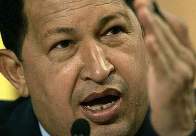Prior to venturing into another philosophically locked article I would mention for those few who may be unaware that Karl Marx was a materialist and an economist! So he offered no real alternative to economics obsessed capitalists. Moving the ball from the forward line to the back line does not change the game or the rules -- as is painfully EVIDENT today.
Enjoy the read but do not forget that neither the 'Left or the 'Right' have any real solutions outside the cause of all the world's problems -- materialist ECONOMICS!

President, Hugo Chávez
Hugo Chávez's rejection of the neoliberal policies dragging Europe down sets a hopeful example to Greece and beyond.
Some years ago, travelling on the presidential plane of Hugo Chávez of Venezuela with a French friend from Le Monde Diplomatique, we were asked what we thought was happening in Europe. Was there any chance of a move to the left? We replied in the depressed and pessimistic tones typical of the early years of the 21st century. Neither in Britain nor France, nor anywhere in the eurozone, did we see much chance of a political breakthrough.
Then maybe, said Chávez with a twinkle, we could come to your assistance, and he recalled the time in 1830 when revolutionary crowds in the streets of Paris had come out waving the cap of Simón Bolívar, the South American liberator from Venezuela who was to die at the end of that year. Fighting for liberty, Latin American style, was held up as the path for Europe to follow.
At the time, I was encouraged but not persuaded by Chávez's optimism. Yet now I think that he was right; it was good to be reminded that Alexis Tsipras, the leader of Greece's radical left party, Syriza, had visited Caracas in 2007 and inquired about the future possibility of receiving cheap Venezuelan oil, much as Cuba and other Caribbean and Central America countries do. There was a brief moment when Ken Livingstone and Chávez conjured up an oil deal between London and Caracas which looked promising until it was rejected by Boris Johnson.
More important than the prospect of cheap oil is the power of example. Chávez has been engaged since the turn of the century, even before, on a project that rejects the neoliberal economics that afflicts Europe and much of the western world. He has been opposed to the recipes of the World Bank and the International Monetary Fund, and has fought hard against the policies of privatisation that harmed the social and economic fabric of Latin America and with which the European Union is now threatening to destroy the economy of Greece. Chávez has renationalised the many industries, including oil and gas, that were privatised in the 1990s.
The words and inspiration of Chávez have had an effect beyond Venezuela. They have encouraged Argentina to default on its debt; to reorganise its economy thereafter and to renationalise its oil industry. Chávez has helped Evo Morales of Bolivia to run its oil and gas industry for the benefit of the country rather than its foreign shareholders, and more recently to halt the robbery by Spain of the profits of its electricity company. Above all, he has shown the countries of Latin America that there is an alternative to the single neoliberal message that has been endlessly broadcast for decades, by governments and the media in hock to an outdated ideology.
Now is the time for that alternative message to be heard further afield, to be listened to by voters in Europe. In Latin America, governments following an alternative strategy have been re-elected time and time again, suggesting that it is effective and popular. In Europe, governments of whatever hue that follow the standard neoliberal template seem to fall at the first fence, suggesting that the will of the people is not engaged.
Chávez and his co-religionaries in the new "Bolivarian revolution" have called for "21st-century socialism", not a return to Soviet-style economics or the continuation of the mundane social democratic adaptation of capitalism, but, as the Ecuadorean president Rafael Correa has described it, the re-establishment of national planning by the state "for the development of the majority of the people". Greece has a wonderful chance to change the history of Europe and to throw their caps of Bolívar into the air, as once the Italian carbonari did in Paris all those years ago. Lord Byron, who planned to settle in Bolívar's Venezuela before sailing off to help liberate Greece, named his yacht Bolívar; he would certainly have been pleased with contemporary developments.
© 2012 Guardian News and Media Limited
http://www.guardian.co.uk/commentisfree/2012/may/16/hugo-chavez-lessons-europe-greece

by cyd 2012-05-16 10:22:46
thank you for your perceptive introduction -- there was life before the 'economy' and there will be a better life after it.
it is an astonishing fact today that few people are able to think outside an economic world view - which is just one of many.
hopefully the world has learned that 'economics' based systems lead to massive inequities and social/environmental ruin -- as is occurring now!